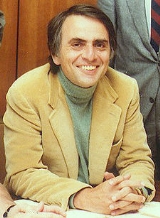
, cosmologist
, author, science popularizer
and science communicator
in astronomy and natural sciences. He published more than 600 scientific papers and articles and was author, co-author or editor of more than 20 books. He advocated scientifically skeptical inquiry and the scientific method, pioneered exobiology and promoted the Search for Extra-Terrestrial Intelligence (SETI
).
Sagan is known for his popular science
books and for the award-winning 1980 television series Cosmos: A Personal Voyage
, which he narrated and co-wrote.
We have designed our civilization based on science and technology and at the same time arranged things so that almost no one understands anything at all about science and technology. This is a clear prescription for disaster.![]()
I try not to think with my gut. If I'm serious about understanding the world, thinking with anything besides my brain, as tempting as that might be, is likely to get me into trouble.
![]()
...that kind of skeptical questioning, don't accept what authority tells you -attitude of science- is also nearly identical to the attitude of mind necessary for a functioning democracy. Science and democracy have very consonant values and approaches, and I don't think you can have one without the other.![]()
Who is more humble? The scientist who looks at the universe with an open mind and accepts whatever the universe has to teach us, or somebody who says everything in this book must be considered the literal truth and never mind the fallibility of all the human beings involved?![]()
In science it often happens that scientists say, "You know that's a really good argument; my position is mistaken," and then they would actually change their minds and you never hear that old view from them again. They really do it. It doesn't happen as often as it should, because scientists are human and change is sometimes painful. But it happens every day. I cannot recall the last time something like that happened in politics or religion.![]()
I am convinced that there are genuine and valid levels of perception available with cannabis (and probably with other drugs) which are, through the defects of our society and our educational system, un-available to us without such drugs.![]()

